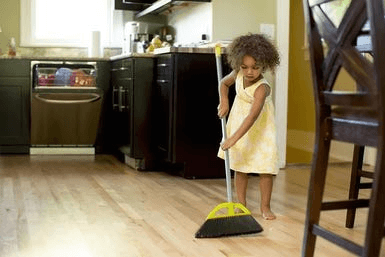Building the Culture of Teamwork through Chores

When I was growing up we did not have a chore chart. There were no stickers, or popsicle sticks or magnets on a whiteboard. There was just an understanding that we pitched in…all hands on deck. My father was in the military until I was about 7, and prior to that, my mother was very sick with breast cancer. For many of my early memories, she was in and out of the hospital and my father worked long hours. We had caregivers and help but there was still a lot to be done.
As the middle of three girls, I vividly remember mornings making my own breakfast (instant oatmeal), my own lunch (simple sandwich), and walking my preschool sister to the bus. Every morning my older sister would put on her Journey Escape album and as we ate our oatmeal there were shared glances that read, “one day at a time- we got this.”
(Yep, then we would walk a mile to school in the Illinois snow – kid you not.)
Being in charge of keeping our shared rooms tidy, putting clothes away, clearing the table and helping to prep dinner…those were all just part of the day-to-day tasks that needed to get done. We didn’t pitch in because there was allowance attached or a prize or we were being nagged, but because we cared. We cared about each other and we knew, inherently, that we were all important in the functioning of the household.
Miraculously my mother recovered, my father was transferred back to California, and we slowly grew into a new dynamic as our family evolved. Certain characteristics remained: our work ethic, our loyalty to each other, and the all-hands-on-deck attitude.
Paul Tough, author of the 2012 bestseller “How Children Succeed” and the new book “Helping Children Succeed: What Works and Why,”, distills the fascinating research by University of Rochester professors Edward Deci and Richard Ryan. Their research suggests that children are more likely to display positive habits like perseverance and intrinsic motivation when they are in an environment where they feel a sense of belonging, independence, and growth. Or, to use Deci and Ryan’s language, where they experience relatedness, autonomy, and competence. Even though I felt sad and worried about my mother at that time, I also felt important and needed and my behavior showed it. I wanted to help.
So how can we do this without the pain of a diagnosis or worry of prognosis?
By building this culture of teamwork, where belonging and independence are valued.
We start this culture first as grown-ups in our relationships with each other by building trust and communication. We realize there are more options than…
A) One partner does it all and one keeps the couch warm.
OR
B) We “share” the load by doing everything together: cooking, grocery shopping, doing laundry, cleaning, buying presents, booking travel.
New Option: We each put in 100% by recognizing our strengths and contributing accordingly.
When my oldest daughter was two, we added “chores” to her routine. Just a couple of minutes after dinner she would set the timer and pick to help with laundry, dishes, or picking up extra toys. Usually, when the timer went off she wanted to keep helping. Now at the age of 7, she makes her own lunch, helps with cooking dinner, sorts the mail, and puts away her own clothes. My 4-year-old has grown up in this culture as well, also without stickers or nagging. We use family meetings to check in about chores each week and find ways to change it up. For a while, ,we “spun” a paper plate to see what chore it landed on, then moved on to pulling straws that had a different chore on each one. Then we went through a phase where laundry and dishes were most exciting. Currently “book duty” has the biggest draw to gather and organize the library. Most importantly we use the challenge of “chores” as teaching opportunities to build capability and a sense of belonging.
My house is not full of whistling happy chore do-ers all the time, but there is often music and there is certainly a sense that it is part of the consistent routine and the way we roll. I would describe their attitudes as confident and capable. When it isn’t chore time? Yep, we create and offer endless opportunities to build those skills too, and pitch in.
Recently my preschooler was carrying a bag to the car when she realized it was heavier than she had bargained for. Instead of whining or dropping it or giving up, she looked at me and said, “Hey mama, how about teamwork?” I took one of the straps and she took the other, and we exchanged smiles that read, “we got this.”
When introducing chores, think about what makes sense for your family, and focus on building capability and belonging. It is most effective when part of an existing routine. For some great ideas, check out this chores list we created for young children:





Comments
Having multiple kids at home can make chores easier if you teach them to work together. Giving them tasks that need teamwork helps share the work. It also shows them the importance of working as a team towards a goal.
Household Tasks